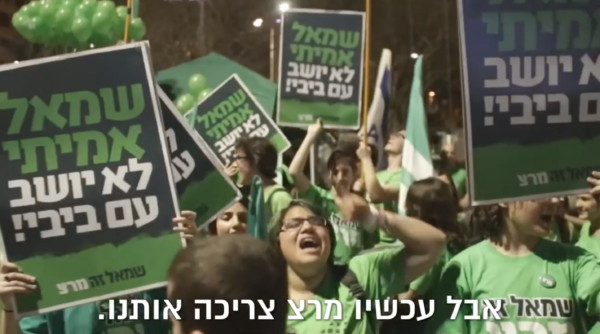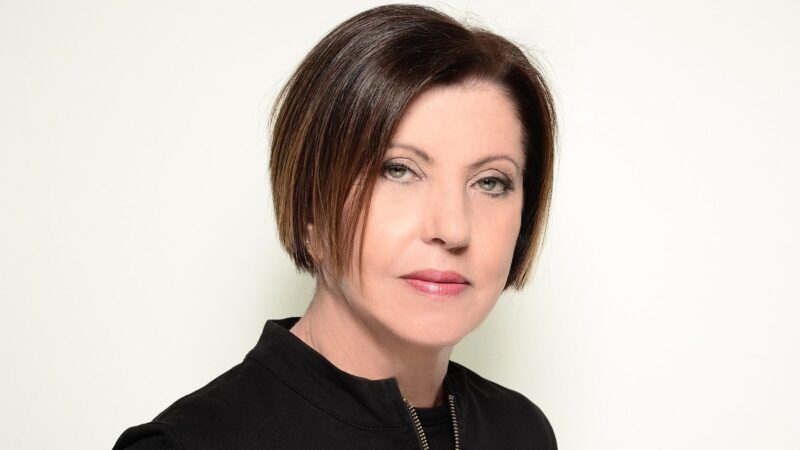Zehava Galon Retakes the Reins: Did Meretz Just Get its Groove Back?
By Ron Skolnik
When more than 15,000 Meretz members voted in Zehava Galon as their new chair in the August 23 primaries, they might well have rescued the party from electoral oblivion this fall. What is more certain, however, is that they helped the party avert a loss of its very essence and raison d’être.
First on oblivion: When, on July 19, Galon announced her political comeback after weeks of pressure from colleagues, led by Regional Cooperation Minister Esawi Frej, Meretz seemed like a party in freefall. Its most senior leaders had declared that they were either taking a timeout from politics for various personal reasons (Frej, as well as Environmental Protection Minister Tamar Zandberg) or, in the case of then-chair and Health Minister Nitzan Horowitz, not seeking reelection to the party’s top post.
Meretz had also just suffered some damaging public embarrassment: One of its Knesset members, Ghaida Rinawie Zoabi, who had been handpicked by Horowitz before the 2021 elections to augment Arab representation on the party’s list, bucked party leadership in crucial votes, undermining the narrow anti-Netanyahu “change government” of which Meretz was a loyal member. Rinawie Zoabi declared that her conscience would not allow her to accept the huge compromises of principle that Meretz was making in order to keep the anti-authoritarian, but right-of- center, government afloat.
Meretz’s voters were none too pleased. More than 90% of them, per an internal poll, saw the government’s stability as the top priority. Incensed by Rinawie Zoabi’s conduct, they began defecting, with Meretz quickly shedding two seats in the polls to the centrist Yesh Atid party of Prime Minister Yair Lapid. Indeed, a series of polls in June and July had Meretz frequently failing to clear the 3.25% minimum vote threshold needed for Knesset representation. The party, in other words, was in palpable danger of ceasing to exist as a viable political entity.
In announcing her return (“I’m coming back, Meretz is coming back”), Galon stressed the electoral urgency. With the only declared candidate for the chair position at the time being retired IDF major-general Yair Golan, a rather politically-green relative newcomer to Meretz, Galon stepped into the breach, stating that she, rather than Golan, could help Meretz overcome its electoral woes. The polls have given credence to her claim: Those taken ahead of the primary suggested that Meretz would be a full seat stronger under Galon’s leadership compared to Golan’s; those taken since Galon’s emphatic (61.6% vs. 37.25%) primary win suggest that the party’s electoral standing has now stabilized above the threshold, in the 4-6 seat range.

But Galon’s victory meant more than just keeping Meretz alive, because the choice between Galon and Golan was also starkly ideological, even philosophical. Since its formation three decades ago, Meretz’s core mission has been to challenge the prevailing discourse within the Jewish Israeli community by pioneering new “radical” ideas and injecting them into the mainstream, such as women’s rights, LGBTQ+ rights, the immorality of the occupation, and more. As Prof. Yossi Mekelberg recently put it, Meretz’s “purpose was to serve as the political and moral compass that Labor had lost.”
While Galon represented a natural continuation of this Meretz mold, Golan took a different approach, suggesting that Meretz revise its discourse and water it down in order to make the party palatable to a wider swath of the Jewish Israeli public. Golan, in other words, wanted to make Meretz look a lot more like the Labor party—a strategy that threatened to recast Meretz’s identity, besides being dubious from an electoral standpoint, with Labor already occupying that lane.
The use of the word “Zionism” figured prominently into this debate, with Golan attacking Galon’s definition of Meretz as an “Israeli party” that avoids defining itself as either “Zionist” or “non-Zionist” in order to be a home to both Zionist and non-Zionist members, both Jewish and Arab citizens, who share a vision of democracy and equal rights. Golan, for his part, said that Meretz should present itself as “Zionist left,” arguing that Galon’s definition isn’t sufficiently electable: “If we restrain ourselves to a self-definition that most Israeli citizens,” a euphemism here for Jewish citizens, “do not accept, we are condemning Meretz to be a niche party forever.” Instead, Golan signaled, he wanted Meretz to speak in a way that could draw votes away from centrist parties such as Yesh Atid and Blue and White.
Galon’s response was that while she herself defined as Zionist, as did all Meretz leaders before her, Meretz needed to remain an “open house” without Zionist “loyalty tests,” where someone like Minister Esawi Frej, a Palestinian Arab citizen of Israel, feels like an equal. She called her approach “inclusive Zionism.” Golan insisted that Zionism was a core part of his, and others,’ identity and needed to be at the forefront of messaging. Galon stressed that the struggle of Zionism, the establishment of the State of Israel, “is behind us” and that the “Zionist yardstick” had been introduced into Israeli discourse by the right wing as a litmus test for delegitimizing Arab citizens and their representatives.
The difference gains sharper resolution when the two frame their aspirations for the future of the Israeli left. Golan believes in a “big, strong Zionist left,” and has suggested in the past that, between Yesh Atid to the right and the non-Zionist Joint List to the left, there is room for only one Zionist party—in other words, a full and permanent Labor-Meretz merger. Galon, like Golan, has endorsed a joint ticket with Labor in the upcoming elections. But Galon regards this not as a path to merger but as a “technical” move, intended to make sure that both parties, while keeping their independence, pass the threshold and keep Netanyahu out of power. Ultimately, her hope is for a “big Israeli, Jewish, Arab social-democratic left.” Golan, upon joining Meretz in late 2020, came out against the vision of a Jewish-Arab party, saying that those in Meretz pushing in that direction needed to be “silenced and suppressed.”
Galon and Golan also clashed on the way that Meretz should talk about the Palestinians and about the West Bank and Gaza. Golan tries to avoid using the word “occupation” to define the military regime beyond the Green Line. In a moment of transparency, though, he explained that while “I recognize there’s an occupation,” his campaign language refers to “separating from the Palestinians” since “the word ‘occupation’ has a negative connotation,” and Israeli voters, he says, won’t support a party that depicts Israel as “the bad guy.” Galon, on the other hand, insisted she’s “not afraid to say ‘occupation’,” noting that this was part of Meretz’s historic role: “Every government needs a left flank to act as a conscience.” Golan seems to believe that Meretz can succeed only if it frames ending military occupation as an Israeli interest and he has criticized the party’s emphasis on its rectitude. Galon believes it’s possible to stress not only Israeli self-interest, but also the moral imperative of bringing Israel’s role as occupying power to a close.
In understanding the differences between Galon and Golan, it is useful to recall their political origins. Galon has been part of Meretz since its founding, while Golan entered Knesset in 2019 through the short-lived “Democratic Israel” party put together by former prime minister and former Labor party chair, Ehud Barak. Democratic Israel teamed up with Meretz in the 2019 elections and Golan joined Meretz only later, once the Democratic Israel framework was put into mothballs.
It should come as no major surprise, therefore, that Golan’s campaign messaging seemed to resurrect the “no Palestinian partner” contention used by Barak after the unsuccessful Camp David Summit in 2000. “I’m not sure there’s anyone to talk to” on the Palestinian side, Golan said in early August, or even “anything to talk about,” appearing to dismiss any diplomatic horizon whatsoever. A nonplussed Galon emphasized in response how out of step Golan seemed to be with the core Meretz mission: “Has he even read the Meretz platform?… Someone has gotten their parties mixed up.” And she slammed Golan’s penchant for diluting the left’s message to such an extent that it ends up reinforcing a rightwing narrative: “‘No partner?… I gather that Yair’s plan is a liquidation sale of Meretz’s values… This is no way to defeat the right; it’s how to surrender to the right.”
Ultimately, Meretz’s membership voted decisively on August 23 against such capitulation. It endorsed—both in the primaries for chair, and for the Knesset list, where anti-Occupation crusader Mossi Raz secured second spot behind Galon—a party that will continue to speak out forcefully and challenge the axioms and norms embedded deeply in the Jewish Israeli mainstream. In the victory speech she delivered that night, Galon made clear that, on her watch, Meretz would behave as a “proud left” that refuses to cloak its truths.
In the meantime, such a posture seems to have energized the Meretz base and pulled the party back from the brink. But whether that’s enough remains to be seen on election day, Tuesday, the first of November.
—

Ron Skolnik is an American-Israeli political columnist and public speaker, whose articles have appeared in a variety of publications, including Haaretz, Al-Monitor, Tikkun, the Forward, Jewish Currents, & the Palestine-Israel Journal






A good article, which very accurately describes the situation in Meretz today. I was one of the people who urged Zehava Galon to reenter politics, and I’m glad that she did.
Thank you, Hillel! That means a lot. I’m glad you were part of the effort to get Zehava Galon back into the fray!